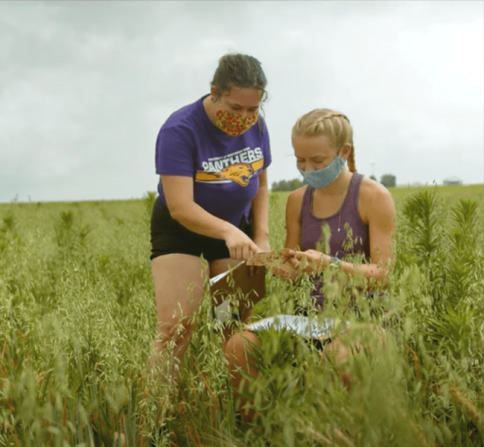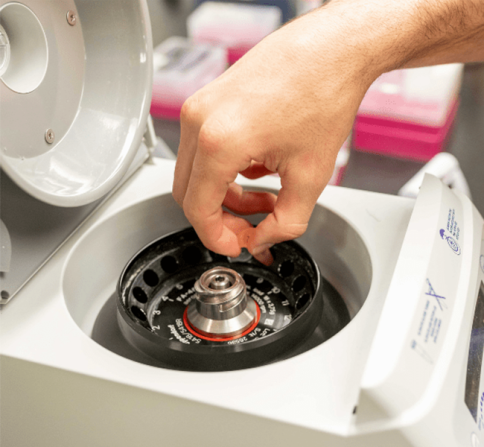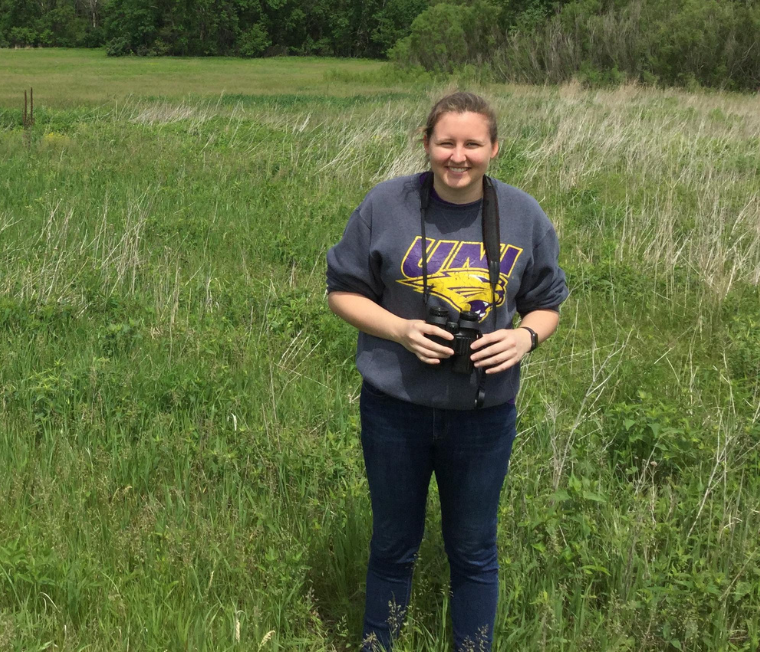Biology M.S.
Receive individualized mentoring as you pursue your passion in research
Our students work with faculty that are curious about life and passionate about advancing scientific knowledge through research. Graduates of our program are well-prepared for successful careers in healthcare, scientific research, education, and natural resource management. Many of our graduate students go on to excel in science-based PhD programs.
Our Biology faculty supervise thesis research projects in the fields of Anatomy and Physiology, Cell and Molecular Biology, and Ecology, Evolution, and Organismal Biology (see Scholarworks for recent Biology M.S. thesis topics). Students can take advantage of a tissue culture facility, CT scanner, flow cytometer, specialized (fluorescence, confocal and scanning electron) microscopes, the UNI Biological Preserves System, as well as strong partnerships with the Tallgrass Prairie Center and UNI Botanical Center.

Supportive
Faculty
Our faculty supervise thesis research projects in Anatomy and Physiology, Cell and Molecular Biology, and Ecology, Evolution, and Organismal Biology.

Top-Notch
Facilities
Our department hosts facilities and resources in support of cell, molecular, and biomedical research.

Partnering
Institutions
Students with research interests in ecology and conservation benefit from strong partnerships with the Tallgrass Prairie Center and UNI Botanical Center
Find out More about Biology M.S.
Tell us more and we'll send information on how you can succeed with a Masters of Science degree in Biology from the University of Northern Iowa College of Humanities, Arts & Sciences.

Mark Myers, Ph.D.
Master of Science in Biology Program Coordinator
Faculty Research Areas
In our program, you will have a Biology faculty mentor who will provide personalized instruction and will help supervise your thesis research project. It is important to work with a faculty member whose research program is a close match to your own interests.
Students with research interests in ecology and conservation benefit from strong partnerships with the Tallgrass Prairie Center, the UNI Botanical Center, and access to the UNI Biological Preserves System. Students regularly conduct research at these facilities, and can find part-time employment at the TPC and Botanical Center.

In our program, you will have a Biology faculty mentor who will provide personalized instruction and will help supervise your thesis research project. It is important to work with a faculty member whose research program is a close match to your own interests.
Facilities and resources in support of cell, molecular, and biomedical research include a tissue culture facility, CT scanner, flow cytometer, and specialized (fluorescence, confocal and scanning electron) microscopes. Students researching in these fields will have access to these cutting-edge tools.

In our program, you will have a Biology faculty mentor who will provide personalized instruction and will help supervise your thesis research project. It is important to work with a faculty member whose research program is a close match to your own interests.
Students with research interests in ecology and conservation benefit from strong partnerships with the Tallgrass Prairie Center, the UNI Botanical Center, and access to the UNI Biological Preserves System. Students regularly conduct research at these facilities, and can find part-time employment at the TPC and Botanical Center.

In our program, you will have a Biology faculty mentor who will provide personalized instruction and will help supervise your thesis research project. It is important to work with a faculty member whose research program is a close match to your own interests.
Facilities and resources in support of cell, molecular, and biomedical research include a tissue culture facility, CT scanner, flow cytometer, and specialized (fluorescence, confocal and scanning electron) microscopes. Students researching in these fields will have access to these cutting-edge tools.

Career Opportunities
With the master’s in Biology you might be ready to apply to a doctoral program and/or advance your career in areas of the life sciences, healthcare, scientific research, education, and natural resource management. For example, our alumni has landed on the following positions:
- Adjunct Professor
- Assistant Director for Research
- Biologist
- Environmental Scientist
- Park Manager
- Research Associate
- Research Technician
- Wildlife Biologist
Courses & Curriculum
- Graduate Colloquium and Scientific Skills
- Research Methods in Biology
- Research
- Electives, such as: Immunology, Evolutionary Biology, Genomics, etc.
Next Steps
Apply Now
Our application process is smooth and easy. You can apply now and pay your fee later or even get it waived, if you qualify. Current or former UNI students will also have their app fee waived.
Requirements for Admission
- Official transcripts from all institutions attended
- Applicant statement
- One letter of recommendation
- 2.75 is the minimum GPA to be accepted without provision; applicants with a GPA lower than 2.75 may still be admitted provisionally
- Application fee (this can be waived or deferred, see if you qualify).
Applications are considered for both Fall and Spring admission, but applications should be submitted by February 1 for full financial aid consideration for the upcoming academic year.
Requirements for International Applicants
Along with the basic application requirements, international applicants also need:
- Proof of English proficiency
- A copy of the personal data page of your passport
- A completed UNI Financial Statement and Certification form
- Non-refundable application fee.
Fund Your Degree
Interested in applying for a graduate assistant position or for Financial Aid? Our department offers a graduate teaching assistant paid position where you'll be able to help with a class taught in the Department of Biology. Visit one of the following pages to learn about graduate assistantships, scholarships or additional details on Biology at University of Northern Iowa.


